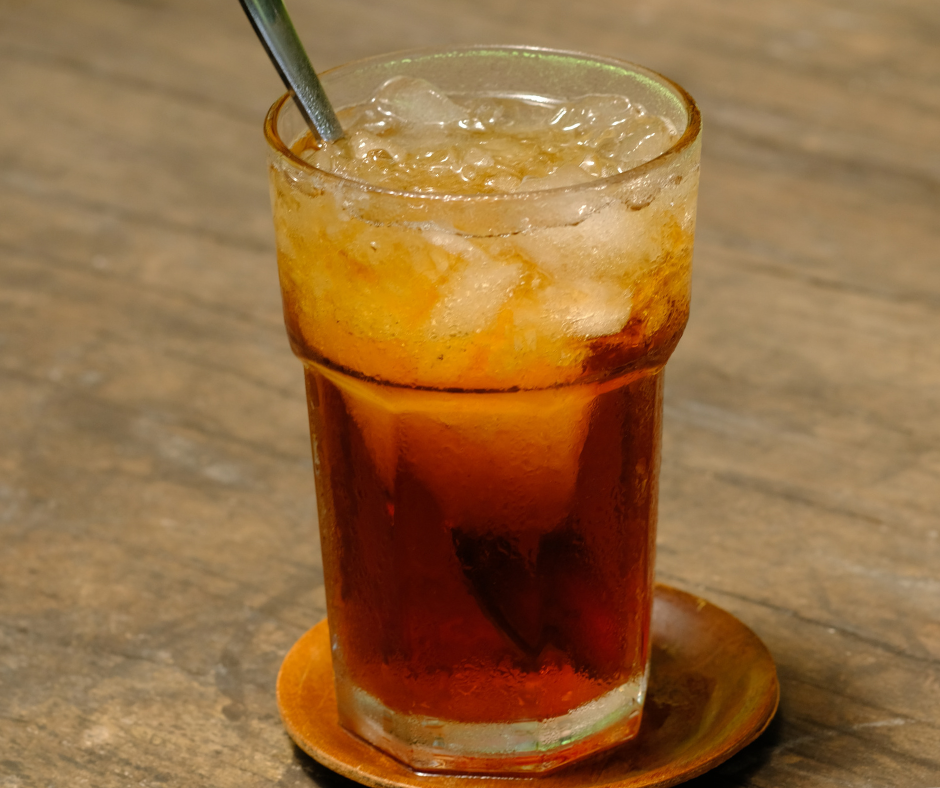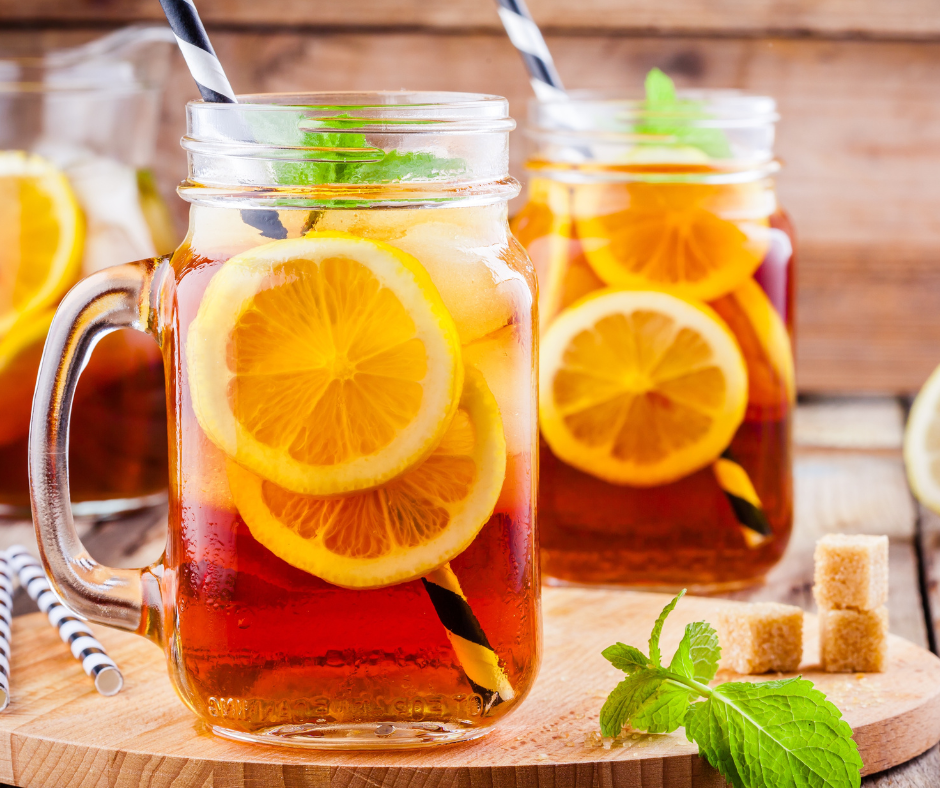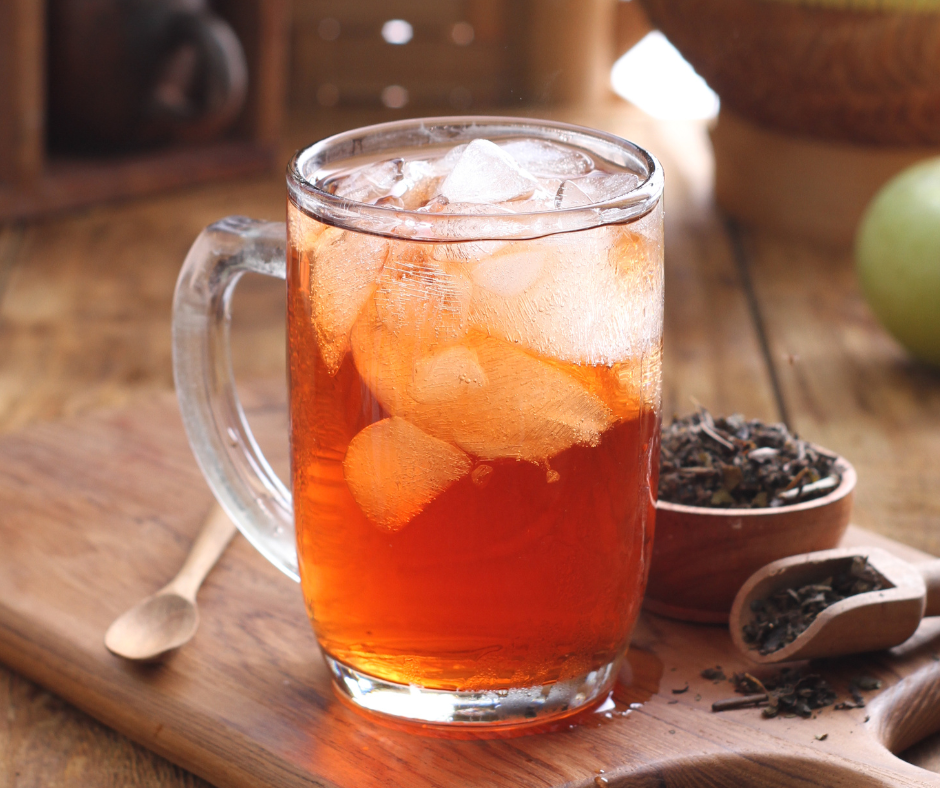Introduction
Iced tea is a popular beverage many enjoy, especially during hot weather. While it is typically a refreshing and relaxing drink, it is also important to consider its caffeine content. But Do Iced Tea Have Caffeine? In this discussion, we will explore the caffeine content in various types of iced tea, the factors that influence it, and how it compares to other beverages like coffee.
What Is Caffeine And Why Is It Important To Consider In Iced Tea?
Caffeine is a natural stimulant found in many plants, including tea. It is a central nervous system stimulant that can increase alertness and reduce fatigue. Caffeine is often derived from tea leaves in iced tea, and its presence or absence can significantly impact its appeal to different individuals.
It is important to consider caffeine in iced tea because it can affect overall health and well-being. While small amounts of caffeine are generally considered safe, excessive consumption can lead to negative side effects such as anxiety, insomnia, and palpitations.
The Controversy Surrounding Caffeine And Health
There is some controversy surrounding the health effects of caffeine, with some studies indicating that it may have potential health benefits while others suggest that it may have negative impacts.
On the positive side, caffeine has been shown to enhance cognitive function, improve mood, and boost metabolism. Studies have also suggested that moderate caffeine intake may reduce the risk of developing certain diseases, such as Parkinson’s disease, type 2 diabetes, and liver disease.
On the negative side, excessive caffeine intake can lead to negative side effects, such as sleeping difficulties and increased heart rate. It can also interact with certain medications, including some types of antibiotics and antidepressants.
In conclusion, while caffeine is a natural component of many iced teas, it is important to be aware of its potential negative impacts. When enjoying iced tea, it is recommended to consume it in moderation and be aware of its caffeine content.
How Caffeine Works
The Science Behind Caffeine’s Effects On The Body
Caffeine blocks adenosine receptors in the brain, promoting drowsiness and sleepiness. By blocking these receptors, caffeine can increase alertness and improve cognitive function. Additionally, caffeine can mobilize intracellular calcium storage and inhibit phosphodiesterases, leading to increased dopamine release, noradrenaline, and glutamate.
How Much Caffeine Is Safe To Consume
According to the US Food and Drug Administration, moderate caffeine intake, defined as 400 milligrams per day, is considered safe for most adults. However, individual sensitivity to caffeine can vary, and excessive consumption can lead to negative side effects such as anxiety, insomnia, and palpitations. Therefore, being mindful of the caffeine content in iced tea and other beverages is important.
In terms of iced tea, the amount of caffeine can vary depending on the type of tea used, the brewing method, and the serving size. On average, an 8-ounce glass of iced tea contains around 47 milligrams of caffeine, significantly less than a cup of brewed coffee that contains around 163 milligrams of caffeine. It is important to note that some iced teas, such as black or green tea, can contain higher amounts of caffeine.
In conclusion, caffeine is a natural component of many iced teas, and moderate consumption is generally considered safe for most healthy adults. However, it is important to be mindful of the caffeine content in iced tea and other beverages and to consume them in moderation. It is also recommended to consult with a healthcare professional for individuals sensitive to caffeine or pre-existing medical conditions.
Do Iced Tea Have Caffeine: The Caffeine Content In Iced Tea
Factors That Affect Caffeine Levels In Iced Tea
The caffeine content in iced tea is primarily influenced by the type of tea leaves used and the steeping time. Black tea, for instance, has a higher caffeine content than green or white tea. While herbal tea is generally caffeine-free, teas made from yerba mate and guayusa leaves have caffeine content equivalent to or even higher than black tea. Steeping time also plays a role in caffeine content, as longer steeping time can extract more caffeine from tea leaves.
Comparison Of Caffeine Content In Iced Tea Versus Hot Tea
Contrary to popular belief, the caffeine content in tea is not affected by whether it’s served hot or cold. Therefore, iced tea made from the same tea leaves would have a similar caffeine content to hot tea made from the same leaves. However, as discussed above, it is important to note that the brewing method and serving size can still influence the caffeine content. So, Do Iced Tea Have Caffeine?
In general, iced tea has a lower caffeine content compared to coffee. While an 8-ounce glass of iced tea contains around 47 milligrams of caffeine on average, an 8-ounce cup of brewed coffee contains around 163 mg. However, some iced teas made from black or green tea may have a higher caffeine content, approaching levels comparable to a cup of coffee.
Consuming caffeine in moderation is generally considered safe for most healthy adults. While iced tea may contain caffeine, the amount is usually lower compared to coffee. However, individuals who are sensitive to caffeine or have pre-existing medical conditions should be mindful of their caffeine intake and consult with a healthcare professional. Consumers can make informed choices about their beverage preferences by understanding the factors that affect caffeine content.
Brewing Techniques And Caffeine
Brewing Methods And How They Affect Caffeine Levels
The brewing method can significantly impact the caffeine levels in iced tea. Hot brewing methods extract more caffeine from tea leaves than cold brewing methods. If you make hot tea and then cool it down to make iced tea, it will likely have a higher caffeine content than cold-brewed iced tea.
How Temperature And Steep Time Impact Caffeine
The temperature and steep time also play a crucial role in caffeine content. Steeping time for a longer duration can extract more caffeine from tea leaves. On the other hand, cold brewing involves steeping tea leaves in cold water for an extended period, usually several hours.
Black tea usually contains more caffeine than green or white tea. Herbal tea, for instance, is generally caffeine-free, while teas made from yerba mate and guayusa leaves have caffeine content equivalent to or higher than black tea.
Contrary to popular belief, the caffeine content in tea is not affected by whether it is served hot or cold. On average, an 8-ounce glass of iced tea contains around 47 milligrams of caffeine, while an 8-ounce cup of brewed coffee contains around 163 milligrams of caffeine.
Therefore, while iced tea might contain caffeine, the amount is usually lower compared to coffee. However, individuals who are sensitive to caffeine or have pre-existing medical conditions should be mindful of their caffeine intake and consult with a healthcare professional. Consumers can make informed choices about their beverage preferences by understanding the factors that affect caffeine content.
Types Of Tea With High Caffeine Content
When people need a caffeine boost, their go-to beverages are coffee or energy drinks. However, tea can also provide a healthy dose of caffeine. Below are some tea types with high caffeine content.
Black Tea, Green Tea, And White Tea: Which Type Has The Most Caffeine?
Black tea is known for its high caffeine content, with an average of 47 milligrams in an 8-ounce cup. Green and white teas, on the other hand, contain less caffeine, with an average of 28 milligrams and 25 milligrams per 8-ounce cup, respectively.
However, this is not always the case. The caffeine content of tea can vary depending on several factors, like the amount of tea used and the brewing method. For example, brewing green tea at high temperatures and for a longer period can increase its caffeine content, similar to black tea.
Flavored Teas And Caffeine Content
Flavored teas like chai and Earl Grey may also have higher caffeine content because they often include black tea as a base. Teas like yerba mate and guayusa are also known for their high caffeine content, equivalent to or more than black tea.
It is worth noting that caffeine content in tea can also differ between brands and types of tea. Matcha tea, for instance, is a green tea known for its high caffeine content, averaging around 70 milligrams per serving.
In conclusion, tea can provide a healthy caffeine boost, and individuals can choose the type that suits their taste, preferences, and caffeine needs. As with any caffeinated beverage, moderation is key, and people should consult with their healthcare provider if they have pre-existing medical conditions or are sensitive to caffeine.
Does Caffeine Break Down Or Evaporate In Iced Tea?
The Myth Of Caffeine Breakdown In Iced Tea Explained Scientifically
Many wonder whether caffeine in iced tea breaks down or evaporates over time, affecting its concentration. However, caffeine is a stable compound that does not undergo significant breakdown or vaporization in iced tea.
The caffeine content in iced tea is essentially the same as in freshly brewed hot tea. The only difference is that iced tea is served cold, which may affect how our bodies absorb caffeine.
Does Ice Dilute Caffeine In Iced Tea?
Another concern is whether ice in iced tea dilutes caffeine, reducing its effect. However, research suggests that the amount of caffeine lost to melting ice is minimal and is unlikely to impact the beverage’s overall caffeine content significantly.
That being said, how quickly we feel the effects of caffeine can vary depending on the drink’s temperature. Hot tea, for instance, may deliver caffeine to the body more quickly than iced tea because the heat can increase blood flow, allowing caffeine to be absorbed faster. In contrast, the cold temperature of iced tea can slow down caffeine absorption, which could be why some people do not feel the same “caffeine rush” as they do with hot tea.
In conclusion, caffeine in iced tea is stable and does not break down or evaporate over time. While ice may dilute caffeine to some extent, the effect is minimal. How caffeine is absorbed in the body may vary depending on the temperature of the drink, but the overall caffeine content of iced tea is roughly the same as that of hot tea.
Caffeine And Your Health
The Potential Benefits And Risks Of Caffeine Consumption
Caffeine is one of the most widely consumed psychoactive substances in the world. It can be found in many beverages and foods, including coffee, tea, chocolate, and energy drinks. While moderate caffeine consumption can have some health benefits, excessive caffeine intake can have negative consequences.
Benefits of caffeine consumption include improved physical and cognitive performance, increased alertness and wakefulness, and enhanced mood. Some studies have also suggested that moderate caffeine consumption may have protective effects against certain diseases, such as Parkinson’s disease, liver cancer, and type 2 diabetes.
However, excessive caffeine intake can cause various health problems, including insomnia, headaches, anxiety, and high blood pressure. Caffeine can also interfere with nutrient absorption and contribute to dehydration.
How Caffeine Affects Sleep, Anxiety, And Other Health Issues
Caffeine can have a significant impact on sleep quality. Drinking caffeine late in the day or excessive amounts can make it difficult to fall asleep and stay asleep. Caffeine can also exacerbate anxiety and panic disorders, as it can increase heart rate and trigger feelings of nervousness or jitteriness.
In addition, certain health conditions may be intensified by caffeine consumption. People with heart disease or high blood pressure, for example, may need to limit their caffeine intake to avoid negative effects on their cardiovascular health.
It’s important to note that everyone’s sensitivity to caffeine can vary, and individual health concerns may influence how much caffeine is appropriate to consume. Suppose you are experiencing negative effects from caffeine consumption. In that case, it may be worth discussing your concerns with a healthcare provider to determine whether you should reduce or eliminate caffeine from your diet.
In summary, caffeine can have positive and negative effects on health depending on the amount consumed and an individual’s sensitivity to the compound. While caffeine can have some benefits, excessive intake can lead to health problems. If you have concerns about caffeine consumption and its impact on your health, consider talking to a healthcare provider for guidance.
Caffeine Alternatives In Iced Tea
Regarding iced tea, caffeine may not be the best option for everyone. Fortunately, several caffeine-free alternatives make delicious and refreshing iced tea.
Decaffeinated Iced Tea: Does It Still Taste Good?
Decaffeinated iced tea is a great option for tea drinkers who still want the taste of regular tea without the caffeine. Traditional black teas like Earl Grey and English Breakfast are widely available in decaf varieties, and they can be brewed and chilled just like their caffeinated counterparts. Decaf green and white teas are also available and can be used to make light and refreshing iced tea. While decaf teas may have less caffeine than regular tea, they still contain a small amount of caffeine, so it’s important to keep that in mind for those sensitive to the compound.
Herbal Iced Teas And Their Caffeine-free Options
Herbal teas are made from steeping herbs, fruits, and flowers in hot water. Unlike traditional teas, they do not contain tea leaves from the Camellia sinensis plant, which means they are naturally caffeine-free. Chamomile, rooibos, and mint are popular herbal tea choices for iced tea, as they are flavorful and refreshing. Hibiscus and fruit-infused herbal blends also make great iced tea options, as they are naturally sweet and tangy.
To make caffeine-free herbal iced tea, simply steep 2 tablespoons of your chosen herbal blend in 4 cups of boiling water, and then chill the tea in the refrigerator until it’s cold. Add sweetener to taste, and enjoy!
Overall, many caffeine-free options exist for those who want to enjoy iced tea without the caffeine jitters. Whether decaf tea or herbal blends, the possibilities for delicious and refreshing caffeine-free iced tea are endless.
Conclusion
Now you should know the answer to ‘Do Iced Tea Have Caffeine?’. While sweet iced tea may be a staple in certain parts of the world, it’s important to consider the caffeine content of the beverage, especially for those sensitive to the compound. Fortunately, there are many alternatives to traditional caffeinated iced tea, including decaf tea and herbal blends.
The Bottom Line On Caffeine In Iced Tea
Caffeine can vary greatly in iced tea depending on the tea type and brewing method. Decaf tea and herbal blends are great options for those needing to regulate their caffeine intake. It’s important to remember that decaf teas still contain a small amount of caffeine, and herbal blends may contain other stimulants like guarana, so it’s important to read the label and ingredients list before consuming.
Tips For Enjoying And Regulating Caffeine Intake In Tea
For those who find themselves sensitive to caffeine, it’s recommended to stick to herbal blends or decaf tea. When consuming caffeinated tea, paying attention to the recommended brewing time and the type of tea being used is important. Green and white tea typically have lower caffeine levels than traditional black tea so it may be a better option for those wanting a caffeine boost without the jitters. Adding milk or cream to tea can also help reduce caffeine’s effects, although this may not be suitable for all dietary requirements.
Overall, iced tea can be refreshing and delicious, whether caffeinated or not. By being mindful of caffeine intake and exploring alternative tea options, individuals can enjoy iced tea without the negative effects of excessive caffeine consumption.
FAQ: Do Iced Tea Have Caffeine?
Q: Do Iced Tea Have Caffeine?
A: Yes, iced tea can contain caffeine, but the amount can vary depending on the type of tea used and how it’s prepared.
Q: Will the caffeine content in an iced tea be the same as hot tea?
A: It depends. If you use the same tea leaves and brew them the same way, the caffeine content should be similar. However, if you use fewer tea leaves or brew the tea for a shorter time, the caffeine content may be lower in the iced tea.
Q: Does the caffeine in iced tea break down over time or when poured over ice?
A: The caffeine in iced tea may break down over time, especially if the tea is left in the fridge for several days. However, pouring the tea over ice should not significantly affect the caffeine content.
Q: Is the caffeine in iced tea absorbed differently by the body than hot tea?
A: It’s possible that the temperature of the tea could affect how quickly the body absorbs the caffeine. Some people may also notice that they don’t experience the same caffeine rush from iced tea as hot tea.
Q: How does the caffeine content in iced tea compare to coffee?
A: The caffeine content in iced tea can vary widely, but it is generally lower than in coffee. The caffeine in coffee can range from 95-165 mg per 8 oz cup, while the amount in iced tea is usually less than 50 mg per 8 oz cup.

Deb Carlson at Crosslake Coffee: Join Deb at Crosslake Coffee for a delightful blend of community, caffeine, and creativity. Discover the cozy ambiance and warm hospitality that make this local coffee shop a beloved gathering spot. From expertly crafted espresso drinks to mouthwatering pastries, Deb invites you to savor every sip and bite. Stay connected with the latest updates on specials, events, and live music performances by following Deb Carlson at Crosslake Coffee on social media. Embrace the vibrant online community and share your love for great coffee and good company with fellow enthusiasts. Don’t miss out on a moment of the Crosslake Coffee experience – connect with Deb on social media today.



